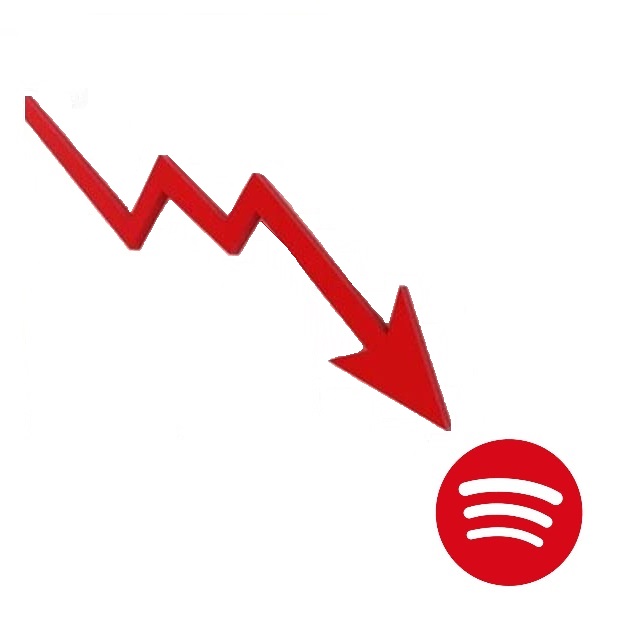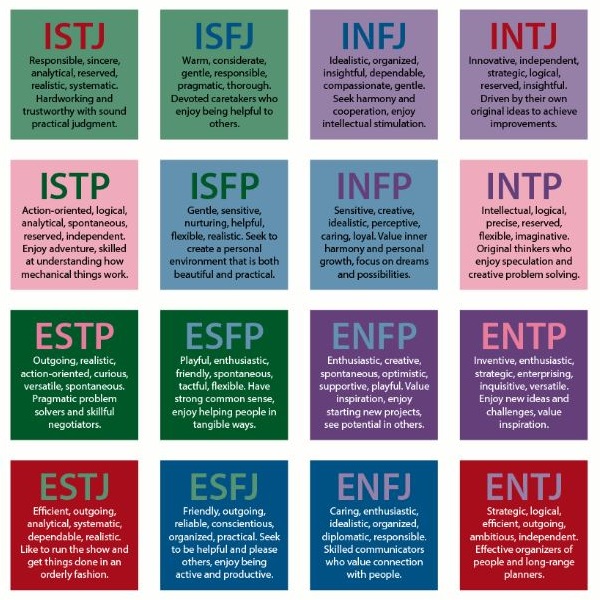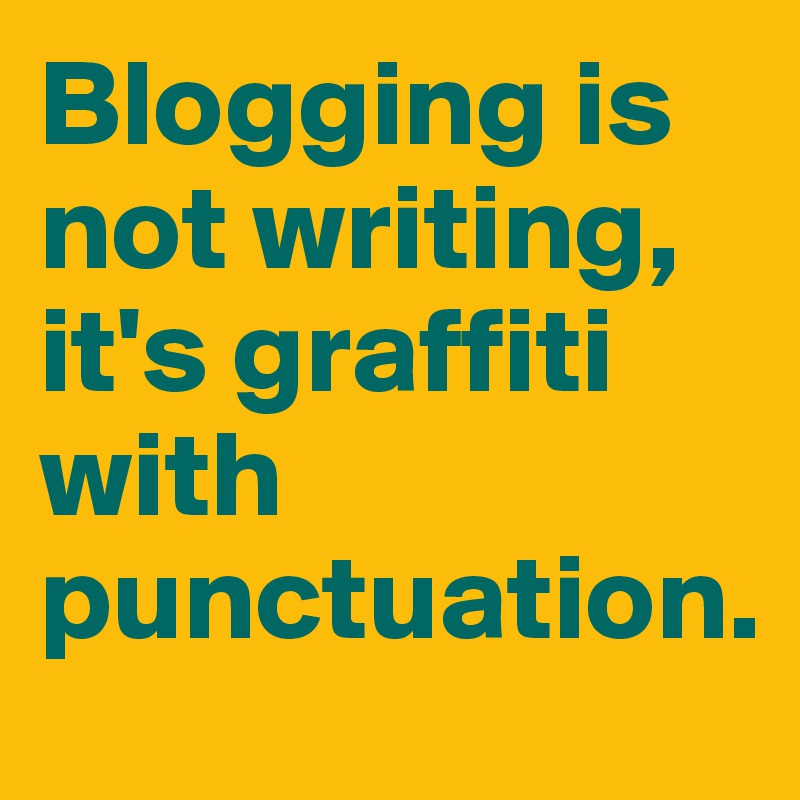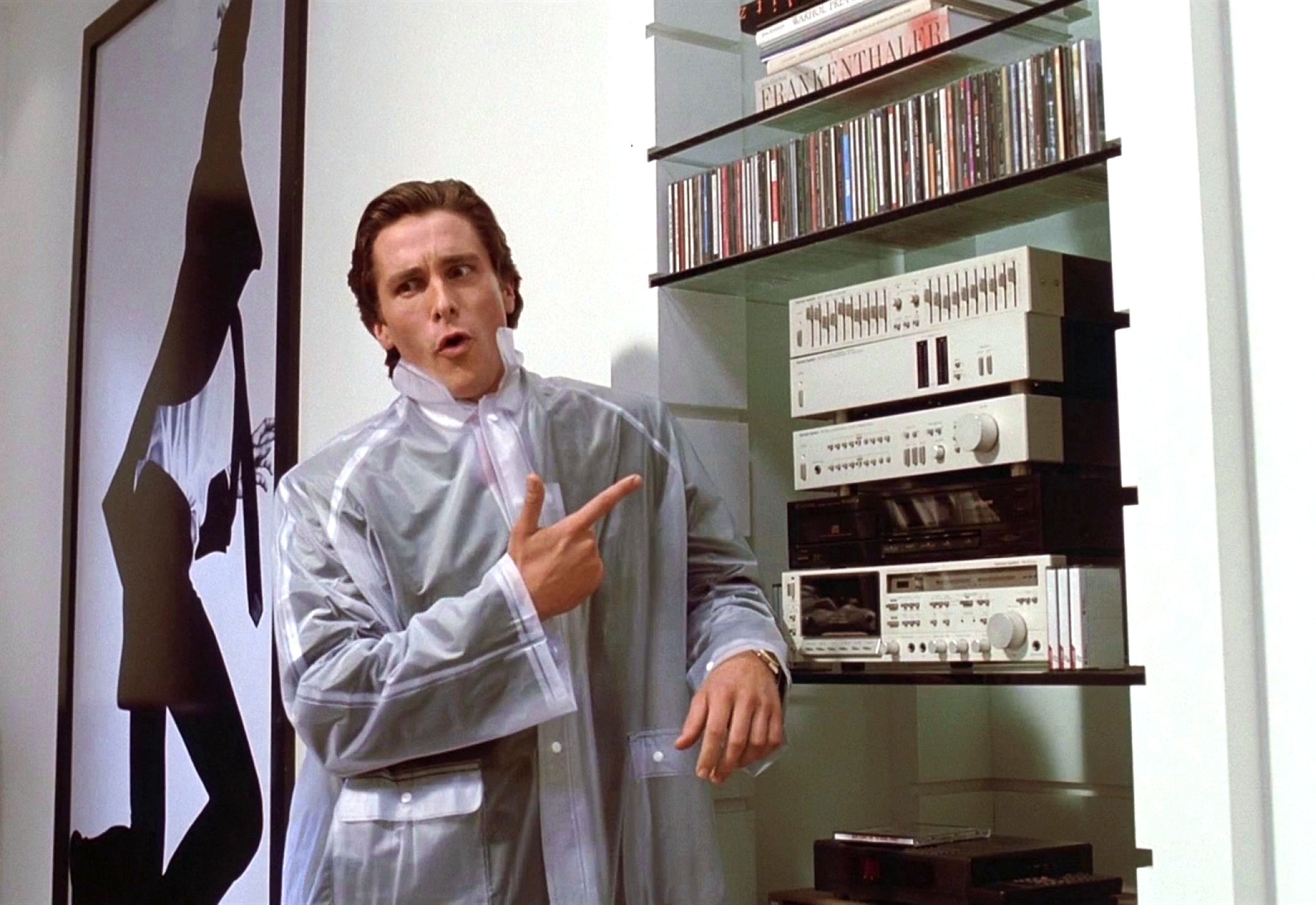 Spotify has published their final accounts for 2020. It's a brutal reading. Spotify has been in the red, a business that is operating at a loss, from day one. But, now the colour of the ink used by accountants has turned into glaring red. The Spotify owners faced losses of biblical proportions. Operating loss amounted to €293m ($335 m). The pre-tax loss amounted to €709m ($810m), no less than five times the equivalent loss in 2019. Net loss amounted to €581m ($664) due to a huge income tax benefit of €128m ($146m). In any other business share price would drop like a stone, but this is cloud cuckoo land. The share price has more than doubled in 2020. The business model is built upon providing digital rights management-protected content from record labels and media companies. That makes Spotify vulnerable. The company is dependent on the revenues that subscribers pay and on the music companies from which it licences content. When revenues increase, so do costs. Spotify are caught between a rock and a hard place. The conversion strategy (by providing freemium, users will upgrade to premium) is an error in cognition. After more than 10 years the share of paying users is still below 50 percent. According to the annual report 2020 the company has about 155 million paying (premium) users (of a total of 345 million users), which makes 45 percent (the premium share was actually higher in 2019 and 2018, 46 percent). In any other business dismissal of top management, hard restructuring and merciless cost reduction would follow. Not in cloud cuckoo land. Instead, it's headless expansion ahead. Spotify’s sales and marketing expenditure surpassed a billon for the first time ever in 2020, €1 029m ($1 176m). And what is the right move from the co-founder and CEO Daniel Ek? He wants to buy Arsenal FC. A good opportunity to fulfil a boyhood dream and burn money like a Russian oligarch. The net worth of Daniel Ek is no less than 3.7 billion dollars. The show will go on. The investors are waiting for their return of investment. The enormous losses will continue until the investors loses their patience. Sooner or later they will understand it's time to put the brakes on the expansion. The strategy has always been growth over profit. In the real world it has to be profit over growth. Some believe in webeconomics (new and unproven economic theory). I don't. I believe in science and gravity. What goes up must come down. The standard annual report disclaimer "Our historical results for any prior period are not necessarily indicative of results expected in any future period" is out of place. Their historical results are a very good predictor of future results. The forecast for 2021? More losses are expected. It's the final accountdown.
Spotify has published their final accounts for 2020. It's a brutal reading. Spotify has been in the red, a business that is operating at a loss, from day one. But, now the colour of the ink used by accountants has turned into glaring red. The Spotify owners faced losses of biblical proportions. Operating loss amounted to €293m ($335 m). The pre-tax loss amounted to €709m ($810m), no less than five times the equivalent loss in 2019. Net loss amounted to €581m ($664) due to a huge income tax benefit of €128m ($146m). In any other business share price would drop like a stone, but this is cloud cuckoo land. The share price has more than doubled in 2020. The business model is built upon providing digital rights management-protected content from record labels and media companies. That makes Spotify vulnerable. The company is dependent on the revenues that subscribers pay and on the music companies from which it licences content. When revenues increase, so do costs. Spotify are caught between a rock and a hard place. The conversion strategy (by providing freemium, users will upgrade to premium) is an error in cognition. After more than 10 years the share of paying users is still below 50 percent. According to the annual report 2020 the company has about 155 million paying (premium) users (of a total of 345 million users), which makes 45 percent (the premium share was actually higher in 2019 and 2018, 46 percent). In any other business dismissal of top management, hard restructuring and merciless cost reduction would follow. Not in cloud cuckoo land. Instead, it's headless expansion ahead. Spotify’s sales and marketing expenditure surpassed a billon for the first time ever in 2020, €1 029m ($1 176m). And what is the right move from the co-founder and CEO Daniel Ek? He wants to buy Arsenal FC. A good opportunity to fulfil a boyhood dream and burn money like a Russian oligarch. The net worth of Daniel Ek is no less than 3.7 billion dollars. The show will go on. The investors are waiting for their return of investment. The enormous losses will continue until the investors loses their patience. Sooner or later they will understand it's time to put the brakes on the expansion. The strategy has always been growth over profit. In the real world it has to be profit over growth. Some believe in webeconomics (new and unproven economic theory). I don't. I believe in science and gravity. What goes up must come down. The standard annual report disclaimer "Our historical results for any prior period are not necessarily indicative of results expected in any future period" is out of place. Their historical results are a very good predictor of future results. The forecast for 2021? More losses are expected. It's the final accountdown.

The question therefore arises: why are we prone to believe inaccurate results? The psychologists have three explanations. We want to learn something we didn’t know about ourselves, we want to belong and we want simple ways to understand other people. MBTI ticks in all boxes. Paradoxically, we find new knowledge about ourselves by filling in a form of how we perceive ourselves. Just like a circular argument. An home-made survey found that goths are introvert and intuitive (INFJ, INTJ, INFP and INFP). Well, goths are introspective and sensitive. However, goths comes in many different shapes and forms. You can be a darkly inclined or a happy-go-lucky goth, read more here (opens in a new window). Some people make a clear distinction between goth and gothic music. "Goth" refers to anything affiliated with the subculture, while "gothic" refers to the aesthetic in general, or to a specific style of the music. In the gothic country genre people don't care much about subtle distinctions. MBTI is used in recruitment, putting an effective workteam together or finding your most compatible romantic partner. A test result with a four-letter personality type is a great conversation opener. Pawn is also a four-letter word. A pawn, a person unwittingly used in a scheme and taken advantage of by others, in their game. People are usually not keen to participate in other peoples games. And besides: human beings, especially goths, are too complex to fit in a simple coordinate system.
 I find it hard to embrace new music. I'm hardened concrete in a mold. It's a rare occasion when I find something new and good. At last, something in common with younger generations. However, it gets weird when parents like the same music as their kids. "What’s the thing with Billie Eilish and old farts. They all seem to love her." This blunt question was raised by the oldest daughter of a good friend. OK boomer, what's the thing? We, the old people, are purists. A purist is one who desires that an object or a person are true to its essence and free from adulterating or diluting influences. You don't become a grim purist over night. This is something you develop and finish over time; sharpening your senses. Authencity is crucial. Personally, I have a penchant for female musicians in flowery dresses who lives in old VW buses. Billie Eilish has green hair and baggy clothes. This will do. I like her. A purists worst nightmare is an industry plant. An industry plant is an artist who has a major record label backing them, but presents themselves as a self made musician to create a pseudo organic following. An industry plant is a derogatory term. The idea is to construct a narrative so the artists can become cash cows for the music industry. Billie Eilish has been accused of being an industry plant. She fits the description. Her family has industry ties. Signed to Interscope Records after releasing three songs on SoundCloud (two crappy songs and "Ocean Eyes"). The song was written by her brother, Finneas. According to some sources for his own band. Yet, he didn't get a record deal. On the other hand, Finneas doesn't have the star quality look. Almost all Billie Eilish songs are written and produced by her brother. Billie and Finneas are "collaborating". But, who is the creative force? In Billie's defense, she has been nothing but transparent about the facts. Being accused of being an industry plant usually causes panic among purists. However, I don't have a problem with Billie Eilish. The Interscope deal launched her to fame and fortune in no time. But an industry plant? There’s supporting documentation on internet in her favour detailing her modest beginnings as an artist. Maybe, other artists had to struggle much harder than Billie to make their break-through. So what? Life isn't always fair. The legal principle that should be applied in this case is "in dubio pro reo" [when] "in doubt, for the accused".
I find it hard to embrace new music. I'm hardened concrete in a mold. It's a rare occasion when I find something new and good. At last, something in common with younger generations. However, it gets weird when parents like the same music as their kids. "What’s the thing with Billie Eilish and old farts. They all seem to love her." This blunt question was raised by the oldest daughter of a good friend. OK boomer, what's the thing? We, the old people, are purists. A purist is one who desires that an object or a person are true to its essence and free from adulterating or diluting influences. You don't become a grim purist over night. This is something you develop and finish over time; sharpening your senses. Authencity is crucial. Personally, I have a penchant for female musicians in flowery dresses who lives in old VW buses. Billie Eilish has green hair and baggy clothes. This will do. I like her. A purists worst nightmare is an industry plant. An industry plant is an artist who has a major record label backing them, but presents themselves as a self made musician to create a pseudo organic following. An industry plant is a derogatory term. The idea is to construct a narrative so the artists can become cash cows for the music industry. Billie Eilish has been accused of being an industry plant. She fits the description. Her family has industry ties. Signed to Interscope Records after releasing three songs on SoundCloud (two crappy songs and "Ocean Eyes"). The song was written by her brother, Finneas. According to some sources for his own band. Yet, he didn't get a record deal. On the other hand, Finneas doesn't have the star quality look. Almost all Billie Eilish songs are written and produced by her brother. Billie and Finneas are "collaborating". But, who is the creative force? In Billie's defense, she has been nothing but transparent about the facts. Being accused of being an industry plant usually causes panic among purists. However, I don't have a problem with Billie Eilish. The Interscope deal launched her to fame and fortune in no time. But an industry plant? There’s supporting documentation on internet in her favour detailing her modest beginnings as an artist. Maybe, other artists had to struggle much harder than Billie to make their break-through. So what? Life isn't always fair. The legal principle that should be applied in this case is "in dubio pro reo" [when] "in doubt, for the accused".
 I recently watched Steven Soderberg's movie Contagion on Netflix, where Elliot Gould's character (a scientist) tells a blogger, played by Jude Law, that: "Blogging is not writing, it's graffiti with punctuation." Ouch. This was hurtful for three reasons. I write blog posts. I don't care much for graffiti. The English language isn't my mother tongue. I probably create the most terrible graffiti imaginable using a linguistic spray can rack. Littering, actually. Then I snapped out of self-doubt and asked myself: is this the brutal truth or just nonsense? Let's take a closer look at graffiti with punctuation. In another blog post I wrote(?) that the written word was dying or at least was in sharp decline. The blunt quote contains a grain of truth. Some blogs are characterized by poor grammar, diction, syntax and lack of editing. However, many blogs have other problems. Putting your thoughts into words isn't automatically a good idea. Better to remain silent and be thought a fool than to speak and to remove all doubt. Blogs about mundane family life, food, training and excercises and blogs referring to other blogs are the worst. You will also be surprised of the absence of written text. It's great when you come across a text which contains one main and subordinate clause.
I recently watched Steven Soderberg's movie Contagion on Netflix, where Elliot Gould's character (a scientist) tells a blogger, played by Jude Law, that: "Blogging is not writing, it's graffiti with punctuation." Ouch. This was hurtful for three reasons. I write blog posts. I don't care much for graffiti. The English language isn't my mother tongue. I probably create the most terrible graffiti imaginable using a linguistic spray can rack. Littering, actually. Then I snapped out of self-doubt and asked myself: is this the brutal truth or just nonsense? Let's take a closer look at graffiti with punctuation. In another blog post I wrote(?) that the written word was dying or at least was in sharp decline. The blunt quote contains a grain of truth. Some blogs are characterized by poor grammar, diction, syntax and lack of editing. However, many blogs have other problems. Putting your thoughts into words isn't automatically a good idea. Better to remain silent and be thought a fool than to speak and to remove all doubt. Blogs about mundane family life, food, training and excercises and blogs referring to other blogs are the worst. You will also be surprised of the absence of written text. It's great when you come across a text which contains one main and subordinate clause.
This little project of mine with the mission statement "to explore and promote gothic country, southern gothic, gothic americana, american gothic and dark americana and ...whatever" is an opportunity to brush up my schoolbook English. The blog is one-way communication and an integrated part of the website. I have the privilege to write impertinent notes without being refuted. I don't exclusively blog about gothic country music. I also blog about fragments of memories, observations, trends, phenomena and nonsense. The blogs are filled with ranting, dissing and crusading. In short, grumpy-old-man behavior. The blog posts are, in contrast to the articles, not search engine optimized (SEO). Clearly, there's a limit for my vigour and diligence. Hopefully they will be read anyway. I spend time on each blog post: researching, writing, editing and searching for a fitting image or even creating one myself. I think it is worth the time spent. Personally, I have the greatest admiration for people who have a special interest (however obscure), are dedicated and passionate, have something to say and can express themselves. Why not in a blog. Blogging could actually be writing.
 There are three great themes of life: love, death and war. But, not necessarily in that order. Death is very popular. However, there are deaths and there are deaths. The concept of death in art has a deeper and symbolic meaning than death in real life. Death in art is often an imaginative play with concepts. But, misconceptions are common. The lawsuits of Vance vs. Judas Priest, McCollum Family vs. Ozzy Osbourne and the Columbine High School Massacre and Marilyn Manson controversy are three good examples. "The music made me do it". Let it be said. No musicians in their right mind wants to be associated with any actual deaths or suicides. In fact, Judas Priest-singer Rob Halford pointed out that encouraging the death of one's own fans would be counterproductive. Not even hard-core nihilists in the Norwegian black metal genre would appreciate the association.
There are three great themes of life: love, death and war. But, not necessarily in that order. Death is very popular. However, there are deaths and there are deaths. The concept of death in art has a deeper and symbolic meaning than death in real life. Death in art is often an imaginative play with concepts. But, misconceptions are common. The lawsuits of Vance vs. Judas Priest, McCollum Family vs. Ozzy Osbourne and the Columbine High School Massacre and Marilyn Manson controversy are three good examples. "The music made me do it". Let it be said. No musicians in their right mind wants to be associated with any actual deaths or suicides. In fact, Judas Priest-singer Rob Halford pointed out that encouraging the death of one's own fans would be counterproductive. Not even hard-core nihilists in the Norwegian black metal genre would appreciate the association.
There are two types of association fallacies: guilt by association and honor by association. The former is bad and the latter is good. Guilt by association is defined as "guilt ascribed to someone not because of any evidence, but because of their association with an offender." Guilt by association is often used as a master suppression technique or debate trick. American Psycho is a 2000 American satire based on Bret Easton Ellis novel of the same name. The protagonist, New York investment banker Patrick Bateman is a full-blown psychopath with terrible music taste. Huey Lewis and the News is right up his alley. The protagonist performs a killing act to one of their biggest hits. It's not honourable to be associated with the music taste of a psycho killer. The guilt by association really stuck. Huey Lewis tried to turn it to his advantage. For the 30th anniversary of the album Sports, the Huey Lewis and the News frontman reenacts the classic scene from American Psycho where Bateman chops his co-worker up with an axe to the band's 1986 hit "Hip to be Square". The ironic video came too late. Huey Lewis and the News are forever associated with insipid music. Here is the twisted dialogue in its entirity:
BATEMAN: You like Huey Lewis and the News?
ALLEN: Um, they're okay.
BATEMAN: Their early work was a little too new wave for my taste. But when Sports came out in '83, I think they really came into their own, commercially and artistically. The whole album has a clear, crisp sound, and a new sheen of consummate professionalism that really gives the songs a big boost. He's been compared to Elvis Costello, but I think Huey has a far more bitter, cynical sense of humor.
ALLEN: Hey, Halberstram? [mistaken Bateman for Halberstram, my remark]
BATEMAN: Yes, Allen?
ALLEN: Why are there copies of the Style section all over the place? Do you... Do you have a dog? A little chow or something?
BATEMAN: No, Allen.
ALLEN: Is that a raincoat?
BATEMAN: Yes, it is. In '87, Huey released this; Fore!, their most accomplished album. I think their undisputed masterpiece is "Hip To Be Square". A song so catchy, most people probably don't listen to the lyrics. But they should, because it's not just about the pleasures of conformity and the importance of trends. It's also a personal statement about the band itself. Hey, Paul!
[Bateman murders Allen with an axe]
BATEMAN: Try getting a reservation at Dorsia now, you fuckin' stupid bastard!
The movie has a couple of great moments of depicting contactlessness, hollowness and shallowness, for example the morning routine scene, break up scene and the business card scene. The final scene (a monologue) is brilliant: "There are no more barriers to cross. All I have in common with the uncontrollable and the insane, the vicious and the evil, all the mayhem I have caused and my utter indifference toward it I have now surpassed. My pain is constant and sharp and I do not hope for a better world for anyone, in fact I want my pain to be inflicted on others. I want no one to escape, but even after admitting this there is no catharsis, my punishment continues to elude me and I gain no deeper knowledge of myself; no new knowledge can be extracted from my telling. This confession has meant nothing."
